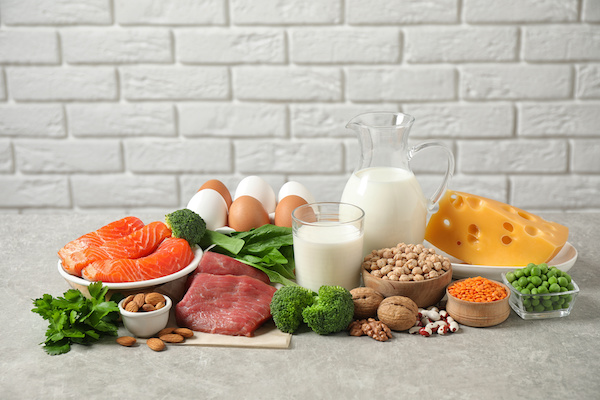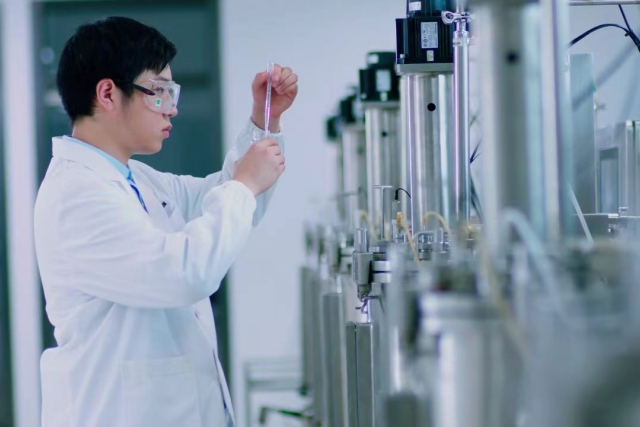-
Home > News & Events > Blog > Enzymes
The Annzyme protease series of products, including Protease AP-200A and Complex protease FF106 comprising both endo- and exo-proteases, have the ability to break down animal and plant proteins into smaller peptides. This process results in the production of peptides with a wide range of functionalities.
Highly hydrolyzing proteins into specific peptide
Strong biological activity of hydrolysates and easy for absorption
Pure taste of hydrolysates

What are Functional Protein Peptides?
Protein is the fundamental building block of life, and without protein, life would not exist. Functional protein peptides are compounds that possess a molecular structure between amino acids and proteins. They serve as structural and functional fragments of proteins and exhibit strong biological activity. Functional protein peptides play a crucial role in maintaining and regulating normal physiological activities such as nervous system function, digestion, reproduction, metabolism, and circulation in the human body.
Based on the classification of raw materials, functional peptides can be divided into two categories: plant-derived and animal-derived.
Plant-derived protein peptides are beneficial to the human body and are formed through the enzymatic hydrolysis or fermentation of plant proteins using hydrolases. This category includes soybean peptides, corn peptides, peanut peptides, and wheat peptides. For instance, by utilizing corn protein as a raw material and employing different processing methods, various functional peptides such as antioxidant peptides, antihypertensive peptides, and anti-tumor peptides can be obtained.
Animal-derived protein peptides are fragments of animal proteins that are degraded into forms beneficial for human health through specific enzymatic hydrolysis. This category encompasses milk protein peptides, collagen peptides, aquatic peptides, and livestock peptides. Milk proteins, for example, can yield casein phosphopeptides, immunomodulatory casein peptides, antioxidant peptides, etc.
Characteristics of Functional Protein Peptides:
1. Easy Absorption
Proteins are large molecular compounds with a molecular weight exceeding 10,000 Daltons. They require digestion to be enzymatically hydrolyzed into amino acids or oligopeptides for absorption by the human body. This hydrolysis process consumes a significant amount of energy and places a heavy burden on the gastrointestinal system.
In contrast, protein peptides have a simpler structure and smaller molecular weight, enabling them to be directly absorbed by the human body through the intestinal mucosa. They can be absorbed and utilized with little or no need for digestion, significantly reducing the digestive burden on the gastrointestinal tract.
This makes them more suitable for individuals with poor digestive ability, nutritional deficiencies, or weakened bodies.
2. Good Processing Performance
Protein peptides exhibit good solubility, stability, and low viscosity. Their natural origin and high safety allow for processing into a powdered form, facilitating storage and transportation.
3. Low Allergenicity
Certain individuals, especially infants, may experience allergic reactions to cow's milk protein or soy protein. However, peptides with molecular weights of around 300-400 or lower do not trigger allergic reactions. Hence, peptides can fulfill the amino acid requirements of susceptible populations and ensure their healthy growth.
4. Low Osmotic Pressure
Protein peptides reduce the likelihood of discomfort symptoms such as diarrhea and vomiting.
5. Multiple Functions
Protein peptides directly participate in cellular metabolism and regulate various physiological functions within the body. They provide essential nutrients for human growth and development while preventing and improving chronic conditions like hypertension, hyperlipidemia, diabetes, osteoporosis, as well as promoting delayed aging and enhanced immunity.
About Annzyme®:
Annzyme is a new brand for Angel enzymes products. We are dedicated to providing customers with perfect solutions in many fields like baking, proteolysis, nucleic acid hydrolysis, starch further-processing etc, and already built highly automated production lines for enzymes and other biological products. We are committed to become the best enzymes supplier and service provider.
About Angel:
Angel Yeast Company is a high-tech listed company specializing in yeast and biotech. Product business covers Yeast and Baking, Yeast Extract-Savoury, Nutrition & Health and Biotechnology fields. It is one of the world's leading companies in the yeast industry. Angel has 12 holding subsidiaries and provides products and services for more than 150 countries and regions.
Press contact:
Angel Yeast Co., Ltd.
Address: 168 Chengdong Avenue, Yichang, Hubei, P. R. China
Tel: +86-717-6369520
Fax: +86-717-6370680
Email: lili@angelyeast.com




